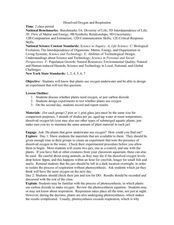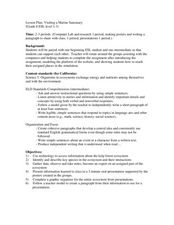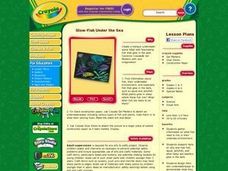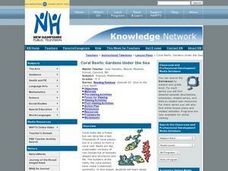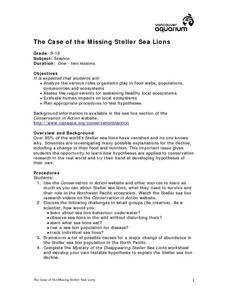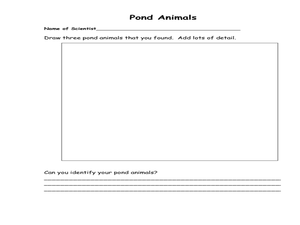Curated OER
Surviving in Our Ecosystems
Third graders investigate the balance of ecosystems and how each species has different survival needs. They research on the internet using the site included. They then participate in activities/centers utilizing the facts they discovered.
NOAA
Deep-Sea Ecosystems – Entering the Twilight Zone
Imagine an ecosystem without any light or oxygen, where living things convert carbon dioxide into food. This ecosystem is thriving and might just be the largest ecosystem on our planet, yet we know very little about it. The lesson...
Shelby County Schools
How Ecosystems Work
How does one organism get its energy? What is the main source of energy in an ecosystem? How does the flow of energy affect different types of ecosystems? Answer these questions with a fill-in-the-blank worksheet.
Curated OER
Dissolved Oxygen and Respiration
Students are presented with the question, "Do plants that grow underwater use oxygen?" They create an experiment to test the presence of dissolved oxygen in the water using provided materials. Student experiments include a control jar as...
Curated OER
Aquatic Ecosystems
Students study the diversity of marine life and their habitats. In this aquatic ecosystems lesson students complete a lab activity and experiment.
Curated OER
Visiting a Marine Sanctuary
Learners gather information on a kelp forest and identify species in that ecosystem. In this underwater ecosystem lesson plan students gather data, give an oral presentation and create a poster.
Curated OER
Diving the Deep
Children research plant and animal components of marine ecosystem, visualize undersea life, and picture themselves wearing scuba-diving equipment needed to explore underwater. Students then create underwater scene in which they explore...
Curated OER
Glow-Fish Under The Sea
Students engage in a lesson that is concerned with the concept of ecosystems. They focus upon conducting research to find information about the water ecosystem. The facts are used as influence to create a drawing of an underwater...
Curated OER
Kure Waste Chase Game Lesson
Learners work together to identify marine debris. They explain the effect of the debris on various ecosystems. They draw different types of ocean currents as well.
NOAA
Biological Oceanographic Investigations – I, Robot, Can Do That!
How do you decide the best person for each job? Would it be easier if you didn't have to consider their feelings? The activity begins with a discussion of underwater robots. Then groups research one of these robots and present their...
Curated OER
Imagine a Kelp Forest
Young scholars write a story based on their research of the kelp forest. In this ecosystem lesson, students view a video and research the kelp forest ecosystem. They write a short story imagining the discovery of a new species in the...
NOAA
What Little Herc Saw
See the underwater world through a different pair of eyes! Middle school marine biologists identify deep-sea organisms by examining images taken by an ROV from the Okeanos Explorer. After determining what creatures lie beneath the...
Curated OER
Dissolved Oxygen and Photosynthesis: 1
Young scholars are taught that plants produce oxygen underwater, and they design an experiment that test this question. They discuss whether plants give off oxygen, and how to measure this. Students measure the increase in dissolved...
Curated OER
Glacier Bay - The Kelp Forest
Few people get to visit Alaska's Glacier Bay, and fewer yet go underwater to explore its kelp forest. Through this presentation, viewers get to do just that! In the process, they learn about the simple structure of kelp and the diverse...
NOAA
Through Robot Eyes
How do robots assist ocean explorers in collecting data and images? The final installment in a five-part series has science scholars examine underwater images collected by robots and identify the organisms shown. Groups then calculate...
Curated OER
America's Underwater Treasures Viewing Guide
Students complete a worksheet while watching a video about how humans affect the ocean environment. They discover the need for a practice of balancing fisheries and their fishing practices. They examine how scientists use data to help...
Curated OER
I'm a Creature, You're a Creature, Wouldn't You Like to Be a Creature, Too?
Third graders demonstrate an understanding of the lifestyles and habits of the underwater life presented in the previous unit. They classify the various sea creatures according to the ecosystem and then use drama skills to present...
Curated OER
Coral Reefs: Gardens Under the Sea
Students discover the wonders of coral reefs while listening to a book about them. In a Reading Rainbow video activity, they simulate a dive, check equipment and explore a reef. Role-playing as marine biologists, students uncover...
National Wildlife Federation
Penguin Fun Facts
What's black and white and can dive up to 1,800 feet under water? That's right, penguins! Learn this and many other amazing facts about these unique birds with this handy reference sheet.
Curated OER
Marine Fisheries Management
Almost 200 slides make this a vast collection! It is a quirky collection, titled "Marine Fisheries Management," but having little to do with that occupation. What you will find are two-toned blue backgrounds with no pictures, but a few...
Curated OER
The Case of the Missing Steller Sea Lions
Young scholars identify and analyze the various roles organisms play in food webs, populations, communities and ecosystems. Students assess the requirements for sustaining healthy local ecosystems. STudents evaluate human impacts on...
NOAA
Community Ecology and Sampling
Seamounts in the Coral and Tasman Seas are home to more than 850 different species. Groups explore hydrothermal vents, researching the organisms found there and their energy source. They also learn about seamounts, exploring their unique...
Curated OER
Surviving in Our Ecosystems
Third graders identify the characteristics of a frog and compare them to a human child. They draw and describe the best environment for a human to live in and the best environment for a frog to live in based on their physical...
Curated OER
Pond and Pond Organisms
Students explore pond ecosystems. In this pond organism activity, students will use pond water and a plastic bad in order to locate and identify freshwater organisms. The activity is designed for younger grades, but...





